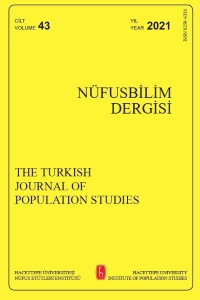TÜRKIYE’DE ÇOCUKLARIN NÜFUSA KAYIT OLMAMASINI ETKİLEYEN DEĞIŞKENLER VE NÜFUSA KAYITLI OLMAYA GEÇİŞ SÜRECİ
Temel amacı, nüfusa kaydedilmeyen beş yaş altı çocukların yüzdesini ortaya koymak, çocukların nüfusa kayıt olmamasını etkileyen değişkenleri tartışmak ve nüfusa kayıt olmama durumundan nüfusa kayıt olma durumuna geçiş sürelerini ve olasılıklarını belirlemek olan bu çalışmada, 1993, 1998 ve 2003 Nüfus ve Sağlık Araştırması verileri kullanılmaktadır. Çalışmanın sonuçları, Türkiye’de son on yıl içinde nüfusa kayıtlı olmayan çocukların oranının yüzde 26’dan yüzde 16’ya gerilediğini göstermektedir. Dini nikahlı ailelerin çocukları arasında yüzde 70’ler seviyesinde olan nüfusa kayıtlı olma durumunun annenin eğitimi ve hanenin refah düzeyi ile doğrusal bir ilişki içinde olduğu gözlenmektedir. Ayrıca, çalışma nüfusa kayıtlı olmamanın durağan bir durum olmaktan çok dinamik bir süreç olduğunu ortaya koymaktadır. Anadili Kürtçe olan annelerin ve sadece imam nikahı ile evlenen anne-babaların çocukları gibi bazı dirençli gruplar dışında, çocukların önemli bir bölümü beş yaşına kadar nüfusa kayıtlı olmama durumundan nüfusa kayıtlı olma durumuna geçiş yapmaktadır.
THE VARIABLES IMPACT ON UNREGISTERED BIRTH IN TURKEY, AND TRANSITION PROCESS TO REGISTERED BIRTH
The main objectives of the study are to determine the size of unregistered birth, the variables impact on birth registration, and the median duration and transtion probabilities from unregistered birth to registered birth. Data comes from the 1993, 1998 and 2003 Demographic and Health Surveys. The findings indicate that percentage of unregistered children decreases from 26 percent to 16 percent during the last ten years. The percentage increases to 70 percent among children to parents in religious (imam) marriage. There appears a positive relationships between the educational level of mothers and welfare of the household and the percentage of registered birth. Another finding of the study shows that transition from unregistered to registered is a dynamic process rather than a static state. Most of the unregistered children, except for children born to some of the resistant groups such as children born to women whose mother tounge is Kurdish, and children born to parents whose marriage type is religious, experienced the transition from unregistered state to registered state up to age 5.
- ISSN: 0259-6334
- Başlangıç: 1979
- Yayıncı: Hacettepe Üniversitesi
